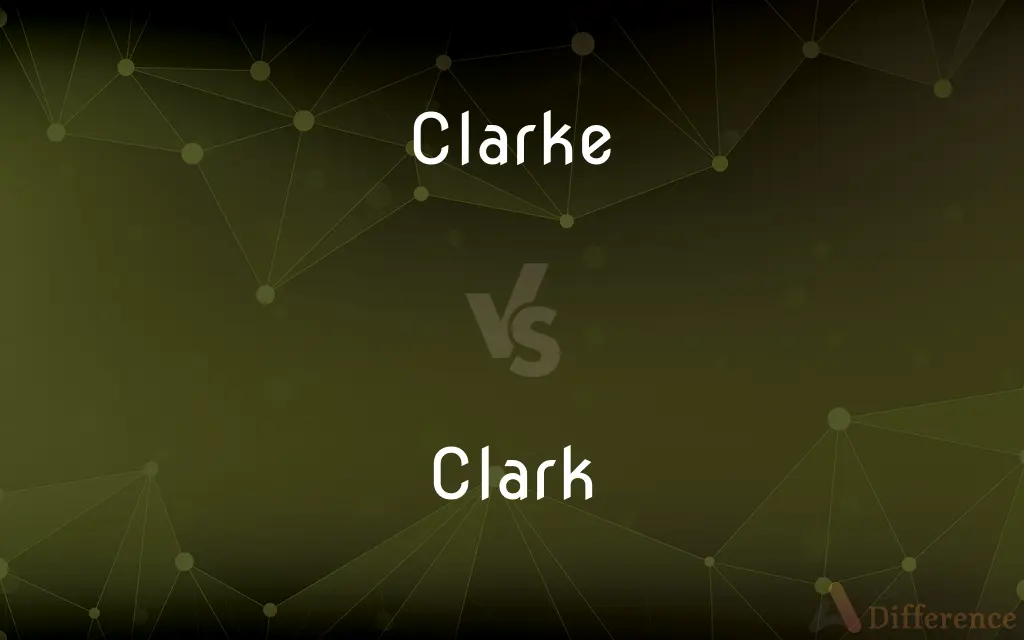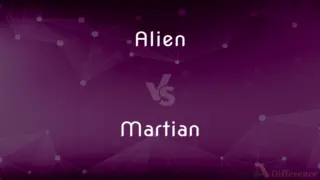Clarke vs. Clark — What's the Difference?
Edited by Tayyaba Rehman — By Fiza Rafique — Updated on March 24, 2024
Clarke and Clark are both surnames of English origin, with "Clarke" traditionally signifying a "clerk" or "scholar," one who can read and write, and includes an "e" at the end, "Clark" is a variant spelling that omits the final "e".

Difference Between Clarke and Clark
Table of Contents
ADVERTISEMENT
Key Differences
The surname "Clarke," with its ending "e," is often considered a more archaic or traditional spelling, reflecting its historical roots in Middle English where the "e" might have been pronounced or used to denote the occupational role of a clerk, scribe, or secretary. "Clark," on the other hand, represents a more modern or simplified spelling that has become widely used, especially in the United States, but maintains the same occupational association with clerical or scholarly work.
Historically, the roles associated with these surnames were crucial in societies where literacy was not widespread. Those bearing the name "Clarke" or "Clark" were typically involved in administrative, legal, or ecclesiastical work, necessitating literacy. This occupational origin of the surname is common to both spellings, highlighting their shared heritage despite the slight variation in form.
The spelling variation between "Clarke" and "Clark" can also reflect regional preferences or familial traditions. For instance, "Clarke" is more commonly found in Britain and Ireland, retaining a more traditional spelling that aligns with other English surnames ending in "e." "Clark," however, is frequently seen in the United States, where spelling simplifications and variations often occurred during the process of immigration and assimilation.
In terms of pronunciation, there is typically no distinction between "Clarke" and "Clark," with both being pronounced the same way. This phonetic similarity underscores the minor nature of the spelling difference and the shared lineage of the two surnames.
Despite the minor spelling difference, individuals with the surname "Clarke" or "Clark" have made significant contributions across various fields, including science, literature, and politics. The choice between the two spellings does not imply a difference in heritage or capability but rather reflects a personal, familial, or regional preference.
ADVERTISEMENT
Comparison Chart
Spelling
Ends with an "e."
Does not end with an "e."
Origin
Reflects a more traditional or archaic spelling from Middle English.
Represents a modern or simplified variant, common in American English.
Regional Usage
More common in Britain and Ireland.
More frequently found in the United States.
Historical Meaning
Signifies a clerk, scribe, or secretary, especially one literate in times when this was uncommon.
Shares the same occupational origin, denoting a person involved in clerical work.
Pronunciation
Pronounced the same as "Clark."
Pronounced the same as "Clarke."
Compare with Definitions
Clarke
A surname of English origin denoting a clerk or scholar, traditionally ending with "e."
Arthur C. Clarke was a renowned science fiction writer.
Clark
A variant of the surname "Clarke," omitting the final "e" but retaining the occupational meaning.
Lewis and Clark were famous explorers of the American West.
Clarke
Often associated with traditional English and Irish heritage.
The Clarke estate in Ireland dates back several centuries.
Clark
Common in American English, reflecting spelling simplification.
William Clark's contributions to botanical science are well-documented.
Clarke
Can indicate a preference for maintaining historical or familial spelling conventions.
The Clarke family crest bears the motto Fortitudo et Fidelitas.
Clark
Associated with individuals in various fields, from literature to science.
Clark Kent is the alter ego of the fictional superhero Superman.
Clarke
Maintains the historical spelling associated with literacy and scholarship.
Emily Clarke's research has contributed significantly to medieval literature studies.
Clark
Reflects a modern adaptation of a traditional surname.
The Clark Institute is renowned for its art collection and research programs.
Clarke
Reflects historical clerical or administrative roles in society.
The Clarke family lineage includes several notable academics.
Clark
Indicates a lineage of clerical or scholarly work.
Dr. Clark's innovations in psychology have been widely recognized.
Clarke
Clarke is a surname which means "clerk". The surname is of English and Irish origin and comes from Latin clericus.
Clark
Clark is an English language surname, ultimately derived from the Latin with historical links to England and Ireland clericus meaning "scribe", "secretary" or a scholar within a religious order, referring to someone who was educated. Clark evolved from "clerk".
Clark
United States explorer who (with Meriwether Lewis) led an expedition from St. Louis to the mouth of the Columbia River; Clark was responsible for making maps of the area (1770-1838)
Clark
United States general who was Allied commander in Africa and Italy in World War II and was commander of the United Nations forces in Korea (1896-1984)
Clark
United States psychologist (born in Panama) whose research persuaded the Supreme Court that segregated schools were discriminatory (1914-)
Clark
Canadian politician who served as prime minister (1939-)
Common Curiosities
Has the spelling of these surnames evolved over time?
Yes, spelling variations were more common in historical records, and the evolution to a standardized spelling is a relatively modern development.
Can the spelling variation affect genealogical research?
Yes, when conducting genealogical research, it's important to consider both spellings, as records may vary over time and place.
Does the "e" in Clarke have any pronunciation impact?
No, the "e" in Clarke is silent, and both Clarke and Clark are pronounced the same way.
Are there any cultural implications associated with these surnames?
While there are no specific cultural implications, the surnames may be associated with historical roles in clerical work and scholarship.
Is one spelling more correct than the other?
No, both spellings are correct, with the choice often coming down to personal or familial preference.
How can I determine the original spelling of my ancestor's surname?
Researching historical documents such as birth, marriage, and death certificates, as well as immigration records, can provide clues to the original spelling.
Can the spelling of a surname change within a family lineage?
Yes, it's not uncommon for surname spellings to vary within families, especially across generations or among branches that have moved to different regions.
Are there any notable differences in the distribution of Clarke vs. Clark?
Yes, Clarke is more commonly found in England and Ireland, while Clark is more prevalent in the United States.
Can the spelling choice of Clarke vs. Clark indicate an individual's heritage?
It might suggest certain regional or familial traditions, but both spellings have a shared English origin.
Are Clarke and Clark completely interchangeable?
While they have the same origin and meaning, they are not completely interchangeable due to personal, familial, or regional preferences in spelling.
Share Your Discovery

Previous Comparison
Bolognese vs. Marinara
Next Comparison
Alien vs. MartianAuthor Spotlight
Written by
Fiza RafiqueFiza Rafique is a skilled content writer at AskDifference.com, where she meticulously refines and enhances written pieces. Drawing from her vast editorial expertise, Fiza ensures clarity, accuracy, and precision in every article. Passionate about language, she continually seeks to elevate the quality of content for readers worldwide.
Edited by
Tayyaba RehmanTayyaba Rehman is a distinguished writer, currently serving as a primary contributor to askdifference.com. As a researcher in semantics and etymology, Tayyaba's passion for the complexity of languages and their distinctions has found a perfect home on the platform. Tayyaba delves into the intricacies of language, distinguishing between commonly confused words and phrases, thereby providing clarity for readers worldwide.
















































